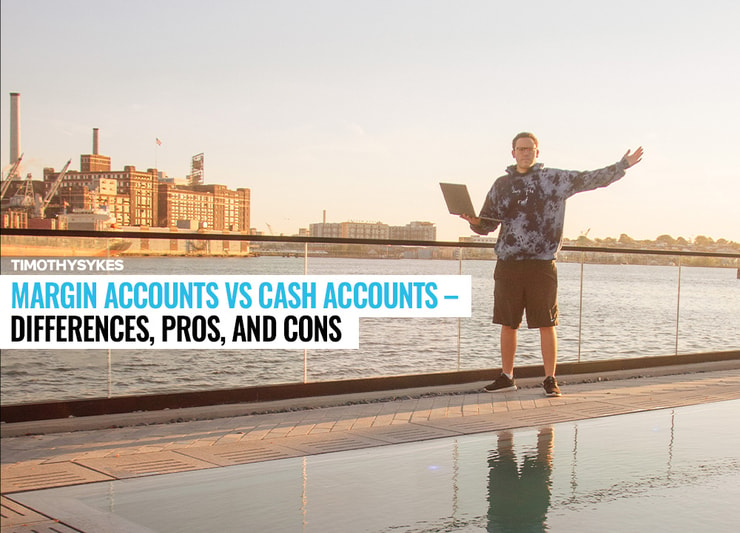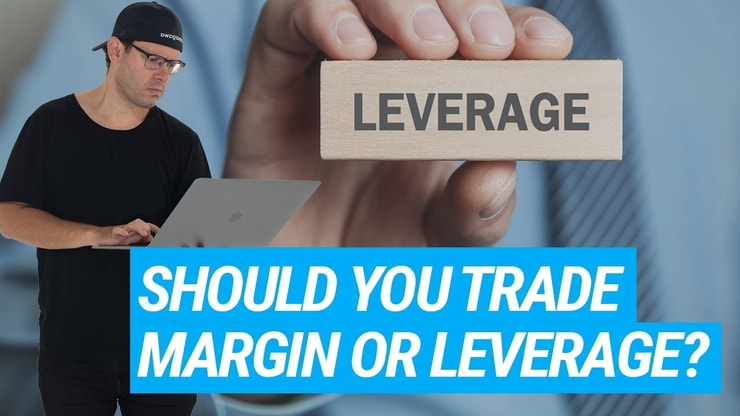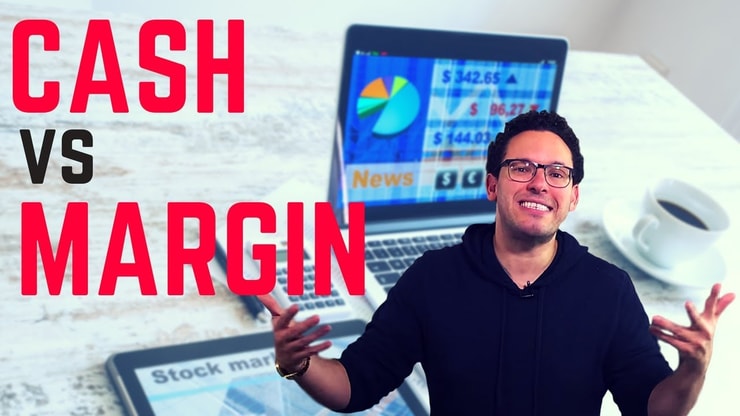Margin accounts let traders use leverage for their trades, while cash accounts require the trader to pay the full sum. That’s the basic difference, but it gets more complicated from there…
Let’s get one thing straight off the bat: margin trading doesn’t equal free money. In fact, it can create even more cash issues in the long term, and I don’t suggest it at all for new traders.
The same borrowed funds that can multiply your profits can also result in devastating losses.
Cash is safer. But regardless of whether you plan on margin trading, it’s useful to understand what it is and how it’s done.
Both have their unique features, benefits, and risks. In this guide, I’ll cover the basics of both kinds of brokerage account — how they work, pros and cons, and what sets them apart. Let’s dive in.
Table of Contents
- 1 What Is a Margin Account?
- 2 How Do Margin Accounts Work?
- 3 Pros of Margin Accounts
- 4 Cons of Margin Accounts
- 5 What Is a Cash Account?
- 6 How Do Cash Accounts Work?
- 7 Advantages of Cash Accounts
- 8 Cons of Cash Accounts
- 9 Comparison of Margin Accounts vs Cash Accounts
- 10 What Is a Margin Call?
- 11 What Is Short Selling?
- 12 What Is a Long Position?
- 13 Key Takeaways
What Is a Margin Account?

A margin account is a type of brokerage account that allows you to borrow money from your broker to purchase securities. Think of it as a loan from your brokerage. You can use this borrowed money to buy more stocks than you could with just your cash, amplifying your buying power.
While margin accounts can provide the leverage needed to amplify your buying power, it’s crucial to understand the implications of using borrowed money in trading. To further your knowledge on this topic, consider exploring the concept of a Margin Account Definition. This resource will provide a more in-depth look at what it means to trade on margin and how it can impact your trading strategy.
How Do Margin Accounts Work?
When you trade using a margin account, you’re essentially using borrowed money.
Your broker lends you the funds, and your securities and additional funds act as collateral. For example, if you have $5,000 in your account, a broker might allow you to borrow another $5,000 for a margined trade, giving you a total of $10,000 to work with.
Pros of Margin Accounts
Margin accounts come with several advantages that can make them an attractive option for active trading purposes.
Leverage
One of the main benefits of margin accounts is leverage. Leverage allows you to amplify your trading potential. If the stocks you purchase with borrowed money increase in value, your returns could be significantly higher than if you had only used your own cash.
Availability of Funds
With a margin account, you have immediate access to your funds. This means you can take advantage of investment opportunities as they arise, without having to wait for cash to settle in your account.
More Breaking News
- Elong Power Shares Plummet Amid $7.6M Priced Offering Woes
- Allegiant Travel Shows Strong Q4 and Earnings Projections Boost Sentiment
- Transocean Insider Share Sales Shake Up RIG Stock Market
- Itaú Unibanco Gears Up for Investor Q&A with 4Q25 Results
Higher Return Potential
Margin accounts can potentially lead to higher returns. By using borrowed money to trade, you can buy more shares than you could with just your own cash. If those shares increase in value, your profits could be substantial.
Short Selling Opportunities
One of the unique benefits of margin accounts is the opportunity for short selling. This is a strategy where you borrow shares of a stock from your broker and sell them, hoping the stock price will fall. Later, you buy back the shares to return to your broker. If the price has fallen, you make a profit from the difference. This strategy is often used with margin accounts, providing a way to profit even when stock prices are falling.
Cons of Margin Accounts

Margin accounts, while offering potential for higher returns, also come with their own set of risks. The most significant of these is the risk of a margin call. If the value of your investments falls below a certain level, your broker may demand that you deposit more money into your account. If you can’t meet the margin call, your broker may sell your securities to cover the loan.
Additionally, you’ll need to keep in mind the interest charges on the borrowed money and the potential for increased losses.
Not All Stocks Qualify
Not all stocks are eligible for margin trading. Some securities might be too risky or not meet the broker’s requirements for margin trading — with sketchy underlying businesses without the financial information required for market compliance.
These companies might make for good trades — but you’ll have to use your own money!
Taking out options for these stocks is one way some traders navigate this weakness… Although options come with their own limitations.
Requirement of a Minimum Margin
Margin accounts often require a minimum balance. This means you’ll need to keep a certain amount of equity in your account at all times. If your account balance falls below this minimum, you could face a margin call, which we’ll discuss later.
What Is a Cash Account?

A cash account is a type of brokerage account where all transactions must be made with available cash. Unlike margin accounts, cash accounts don’t allow you to borrow money from your broker to buy securities. This means you can only trade with the money you have in your account.
How Do Cash Accounts Work?
Cash accounts are the more straightforward brokerage accounts you can choose. When you trade using a cash account, you’re only using your own money. You can’t borrow funds from your broker, so you won’t be able to buy more stocks than you can afford. Once you buy a stock, you’ll need to wait for the trade to settle before you can use that cash again.
Cash accounts require a solid understanding of various investment vehicles to maximize their potential. One such vehicle is an Individual Retirement Account (IRA). If you’re interested in long-term investment strategies, you might want to look into the Best IRA Accounts. This guide will help you understand how IRAs work and how they can fit into your overall investment strategy.
Advantages of Cash Accounts
Cash accounts offer a more straightforward approach to trading. Since you’re only trading with your own money, you won’t owe anything to your broker if your investments go south. This can help limit your potential losses. Additionally, cash accounts can offer peace of mind. You won’t have to worry about margin calls or interest charges, and you’ll always know exactly how much money you have at risk.
Cash accounts also offer the opportunity to invest in tax-advantaged accounts like Roth IRAs. If you’re considering diversifying your investment portfolio, understanding the Best Roth IRA Accounts can be beneficial. This guide will provide insights into how Roth IRAs work and how they can contribute to your financial goals.
Preventing Investors from Unexpected Losses
One of the main advantages of cash accounts is that they can help prevent unexpected losses. Since you’re only trading with your own money, you won’t owe anything to your broker if your investments go south. This can help limit your potential losses.
No Chances of a Marginal Call on the Account
With a cash account, you won’t have to worry about margin calls. A margin call happens when the value of your investments falls below a certain level, and your broker demands that you deposit more money into your account. Since you’re not borrowing money with a cash account, you won’t face this risk.
Cons of Cash Accounts
Despite their simplicity, cash accounts also have their drawbacks. One of the main disadvantages is the settlement period. After you sell a stock, you’ll need to wait a few days for the transaction to settle before you can use that cash to make other trades. This can slow down your trading activity and potentially cause you to miss out on investment opportunities.
Additionally, without the ability to borrow funds, your buying power is limited to the cash available in your account.
Cash to Pass Through a Settlement Period
The main downside of cash accounts is the settlement period.
After you sell a stock, you’ll need to wait a few days for the transaction to settle before you can use that cash to make other trades. This can slow down your trading and cause you to miss out on opportunities.
Comparison of Margin Accounts vs Cash Accounts
When comparing margin accounts and cash accounts, it’s clear that each has its own advantages and disadvantages. Margin accounts offer the potential for higher returns and immediate access to funds, but they also come with higher risk and certain restrictions. On the other hand, cash accounts can limit potential losses and avoid margin calls, but they require a settlement period and limit your buying power.
What Is a Margin Call?
A margin call occurs when the value of your positions fall below a certain level, and your broker demands that you deposit more money into your account. This is a risk associated with margins. Margins are loans, and if you can’t meet the margin call, that’s when brokers may sell your securities to cover the loan.
What Is Short Selling?
Short selling is a trading strategy where you borrow shares of a stock from your broker and sell them, hoping the stock price will fall. Later, you buy back the shares to return to your broker. If the price has fallen, you make a profit from the difference. This strategy is often used with margin accounts.
What Is a Long Position?
A long position is when you buy a stock with the expectation that its price will rise. This is the most common strategy used in both margin and cash accounts. You profit when the price of the stock increases.
Key Takeaways

Choosing between a margin account and a cash account depends on your investment goals, risk tolerance, and trading strategy. Margin accounts offer leverage and higher return potential but come with increased risk and the possibility of a margin call. Cash accounts, on the other hand, limit potential losses and avoid margin calls but require a settlement period and limit your buying power.
Trading isn’t rocket science. It’s a skill you build and work on like any other. No matter the goals you have in mind, smart trading can help you get there. Trading has changed my life, and I think this way of life should be open to more people…
I’ve built my Trading Challenge to pass on the things I had to learn for myself. It’s the kind of community that I wish I had when I was starting out.
We don’t accept everyone. If you’re up for the challenge — I want to hear from you.
Apply to the Trading Challenge here.
Trading is a battlefield. The more knowledge you have, the better prepared you’ll be.
Do you have a cash or margin account? Let me know in the comments — I love hearing from my readers!











Leave a reply